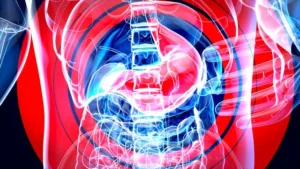Gastric pain, or stomach pain, is a common complaint among people of all ages. It may be mild and fleeting or it can be severe and chronic. Gastric pain is caused by a variety of factors, such as eating certain foods, consuming certain beverages, infection, or underlying medical conditions. Fortunately, there are some dietary and lifestyle changes that can help to reduce the severity and frequency of gastric pain.
Dietary Changes
Making certain dietary changes can be effective in reducing the severity and frequency of gastric pain. One of the most important changes is to reduce the amount of fatty and spicy foods that are consumed. Fatty and spicy foods can irritate the stomach lining and cause gastric pain. Additionally, avoiding alcohol and caffeine can help reduce the risk of gastric pain.
It is also important to eat smaller meals throughout the day, rather than eating large meals. Eating smaller meals can help to reduce the amount of acid that is produced in the stomach, which can help to reduce gastric pain. Additionally, eating slowly and chewing food thoroughly can help to reduce the risk of gastric pain.
It is also important to stay hydrated by drinking plenty of fluids throughout the day. Dehydration can cause the stomach to produce more acid, which can lead to gastric pain. Additionally, drinking warm liquids such as herbal teas or warm water can help to soothe the stomach and reduce pain.
Finally, it is important to avoid foods that can trigger gastric pain in some individuals. Common trigger foods include dairy products, processed foods, and foods that are high in sugar or fat. Keeping a food diary and noting which foods cause gastric pain can help to identify and then avoid these trigger foods.
Lifestyle Changes
Making certain lifestyle changes can also help to reduce the severity and frequency of gastric pain. For example, it is important to manage stress levels in order to reduce the risk of gastric pain. Stress can cause the stomach to produce more acid, which can lead to gastric pain. Therefore, it is important to find ways to manage stress such as yoga, meditation, and deep breathing exercises.
Additionally, it is important to get enough sleep in order to reduce the risk of gastric pain. Research has found that a lack of sleep can increase the risk of gastric pain. Therefore, it is important to get at least seven to eight hours of sleep each night.
Finally, it is important to exercise regularly in order to reduce the risk of gastric pain. Exercise can help to reduce stress levels, which can help to reduce the risk of gastric pain. Additionally, regular exercise can help to improve digestion, which can help to reduce the risk of stomach pain.
Conclusion
Gastric pain can be uncomfortable and debilitating. Fortunately, there are some dietary and lifestyle changes that can help to reduce the severity and frequency of gastric pain. These include reducing the amount of fatty and spicy foods that are consumed, avoiding alcohol and caffeine, eating smaller meals, drinking plenty of fluids, avoiding trigger foods, managing stress levels, getting enough sleep, and exercising regularly. By making these changes, individuals can reduce the risk of gastric pain and help to improve their overall health and wellbeing.










Stomach nerve symptoms can be treated by eating the following:
Carbonated water: to which some cinnamon, fennel, mint, or ginger can be added. Ginger: Various scientific studies have shown that ginger is effective in treating many annoying symptoms that affect the stomach, as it contains anti-inflammatory properties in addition to other nutrients. Mint: Peppermint is often used to treat nausea, stomach irritation, and as a pain reliever, so add it to tea or chew mint leaves. Apple cider vinegar: It can be hard to take on its own, so mix it with a glass of water and a teaspoon of honey.